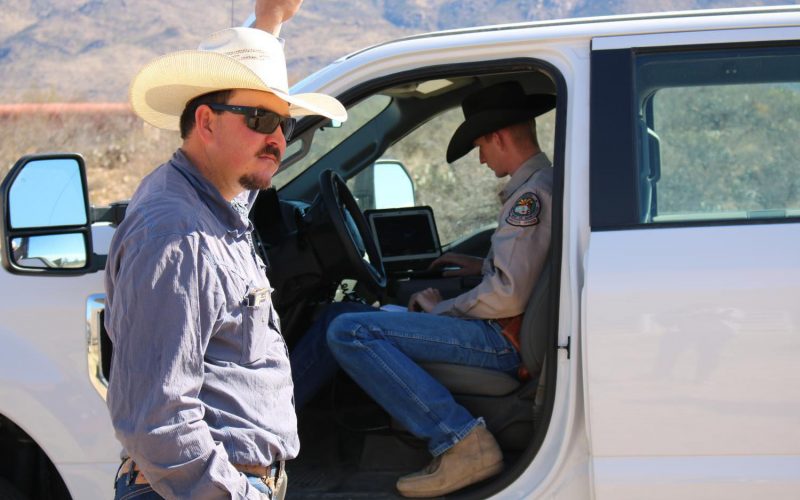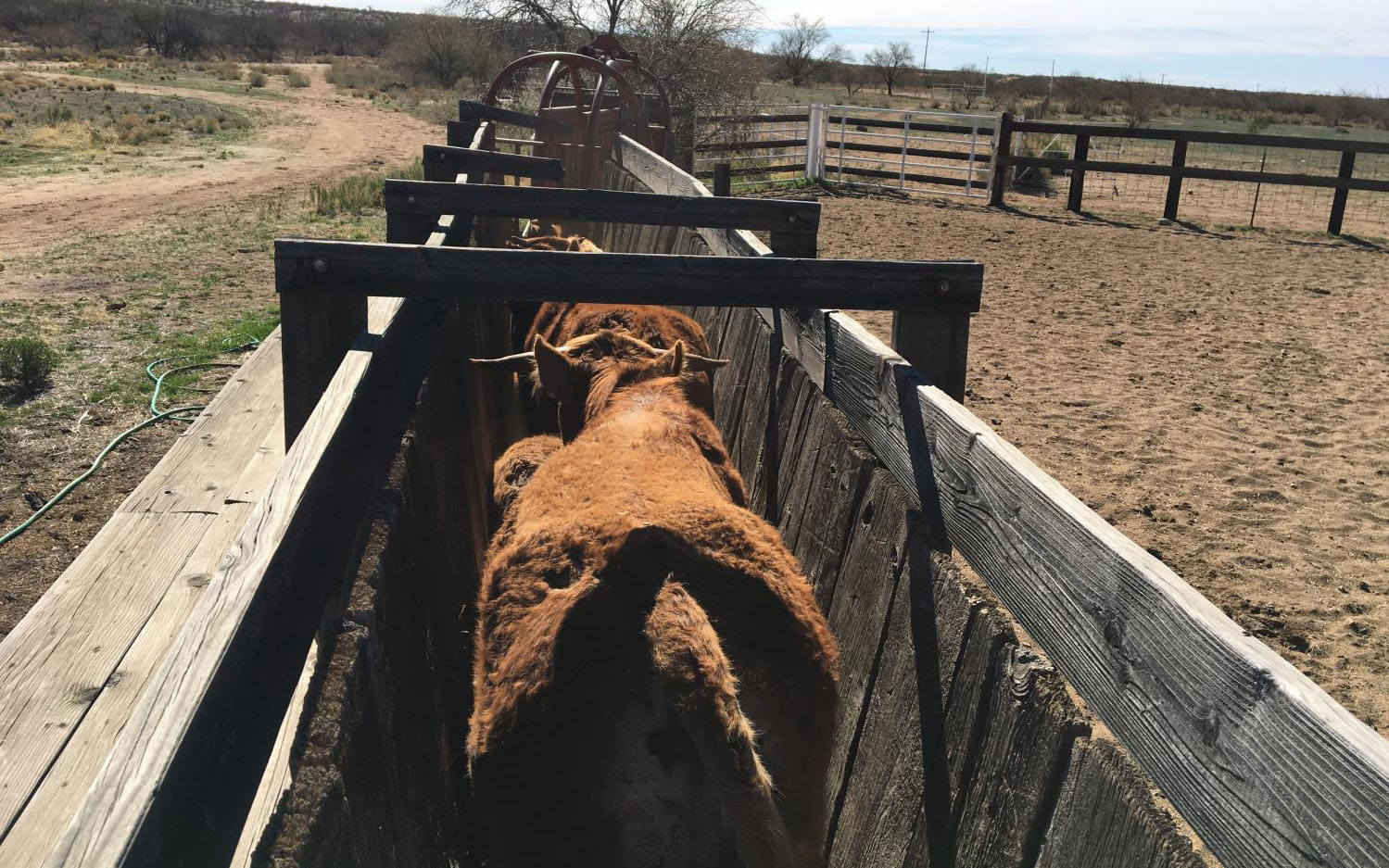
Livestock officer Garrett Lacey checks to be sure Ty Sorrell (left) has the proper paperwork on a dozen head of cattle he rounded up near Lake Pleasant. Lacey is one of the youngest livestock officers for the state Department of Agriculture, covering a good chunk of central Arizona. (Photo by Casey Kuhn/KJZZ)
PHOENIX – The median age of a farmer or rancher in Arizona is 55 to 64. It’s part of a nationwide trend as fewer young people go into agriculture. But three Arizona millennials are hoping to use their passion and the technology they grew up with to ensure the future of the state’s agribusinesses, which generated $23.3 billion in 2017.
In a rural stretch of Arizona between Phoenix and Yarnell, two cowboys struggle to get a stubborn cow to stand up and move through a narrow wooden chute. She’s lying down because there’s no room to turn around. The cow is one of a dozen or so roped by Ty Sorrells, who rides into rough country on horseback to round up stray and feral cattle; he found these near Lake Pleasant.
Garrett Lacey, a livestock officer for the Arizona Department of Agriculture, looks over the cows, which will be trucked to a ranch and auctioned off. Lacey needs to inspect them before that. He writes down how many bulls and heifers are in the bunch.
“The auction requires us to make sure that Ty didn’t steal these cows,” said Lacey, who’s in his early 20s and one of the youngest livestock officers in the agriculture department.
That’s where Lacey comes in. His paperwork, which Sorrells signs on Lacey’s iPad, is proof that the cowboy is legit.
“At the sale barn, they’re going to ask Ty for his paperwork, so that paperwork is going to match the load that they’re coming in,” Lacey said.
To inspect livestock before they’re transported or slaughtered, Lacey drives his truck hundreds of miles for his job, listening to podcasts to pass the time.
To him, being a millennial in agriculture means using technology to help things along, such as having people send self-inspection paperwork to his phone instead of making a trip for one or two head of cattle.
“It’s super nice where … where I can just … text me or email and I’ll email it, I’ll send a screenshot, and it’s gone,” Lacey said.
And he’s all over cowboy social media, where people show off their roping catches – legal or not. Lacey monitors Snapchat and YouTube for any kind of illicit activity, but most of the time, he said, it’s difficult to determine where videos were taken or whether the cow technically was captured illegally.
Lacey finishes his paperwork for Sorrells’ cattle before heading to his next assignment.
On our ride-along, we pass through the part of metro Phoenix where he grew up, which he says shaped his life path.
“This is what I knew. We always ran around and played in the river bottom,” Lacey said.
That’s the kind of background you’ll often hear about when speaking with young farmers and ranchers. Many take pride in being a multigenerational farmer.
Alexander Khan does not fit that definition. The 24-year-old rancher is a graduate of Brophy College Preparatory in Phoenix and heading to law school soon. His family just bought a cattle ranch near Perkinsville, northwest of Cottonwood.
“I also am really drawn to the work that’s involved, the lifestyle and everything that goes into having an operation that is closely connected to the land,” Khan said.
The Census Bureau says more than 2,500 Arizona farmers are younger than 35, and almost half are Native American. In addition, most of the operations run by young producers are beef, sheep and goat ranches.
Khan, too, thinks his generation realizes the potential in using the technology they grew up with to make a better ranch.
“A lot of people my age are coming together and talking about what they’re doing on their ranches and how they’re incorporating data tools and new technology to make ranching more effective, more sustainable and more profitable as well,” he said.

Ty Sorrell rounds up strays and wild cattle to sell at auction – but first he must be able to prove he didn’t steal them. (Photo by Casey Kuhn/KJZZ)
And Khan isn’t just talking about the environment.
“Just kind of making sure these things are sustainable not only ecologically but sustainable as lifestyles and business practices that we can carry into the future,” he said.
The high cost of entry, which includes buying expensive land, harvesters and material, can be a major barrier for young producers.
“The average farm story is, you’re one bad crop away from total failure,” Khan said.
Selwyn Justice has the farming background Khan does not; he says his family has farmed in America since the 1600s.
Justice, 30, runs a U-pick citrus farm in Surprise. And he really knows his citrus, growing 76 varieties.
“We also have the cara cara, which is a pigmented navel that a lot of people mistake for a variety of blood orange, which it’s not. But speaking of blood oranges, we have a couple of blood oranges, too,” he said.
Justice has diversified by using his farm as more of an education experience. He also helps a friend, who found Justice through Facebook, grow his cactus in a small nursery plot.
In addition, Justice is a member of the National Young Farmers Coalition, an advocacy group that hosts seminars, such as a legal presentation on water rights in Arizona. The federal government also has funding and support programs for new farmers.
The future of farming rests in millennials’ hands, with a look toward more sustainability to keep farming a viable career moving forward.